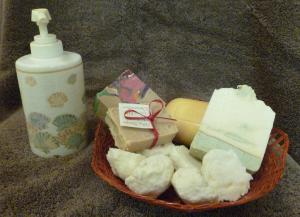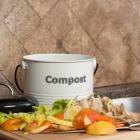Liquid vs. Bar Soap, which is more environmentally friendly?
Submitted by Lisa on | Updated Thu, 31/01/2019 - 03:16

I recently made the decision to switch from liquid soap to bar soap for personal washing. I was pretty sure bar soap would be more environmentally friendly than liquid soap in plastic bottles. My online research confirmed my hunch but also brought to light another issue that I hadn't even considered.
A 2009 Swiss study found that the carbon footprint of liquids is about 25 percent larger than that of bar soaps on a per wash basis. Liquid soap requires five times more energy to produce and nearly 20 times more energy to package, and, we use about seven times more liquid soap than bar soap for each hand wash. Even though we tend to use about 30 percent more heated water washing with bar soap, it was still the environmental winner.
The environmental issue that I hadn't considered was that traditional bar soaps are made from fats and oils which come from farmed crops that can have a significant environmental impact on land. For example, there are approximately 11 million hectares of oil palm plantations worldwide and in many places these plantations are taking over rainforests, the natural habitat of endangered species such as orangutans. Alternatively, most liquid soaps are made of petroleum based synthetic surfactants which of course come with their own set of environmental impacts.
I'm sticking with my personal choice to go with bar soap. If you make a similar soap choice, here are several ways that you can reduce your environmental impact even more:
-
Look for soaps in minimal packaging, avoiding unnecessary plastic overwraps and extra layers. Many bar soaps are available in biodegradable and recyclable cardboard boxes and some local soap makers offer their product with no packaging at all.
-
Avoid potentially hazardous, both to us and the environment, chemicals by selecting a natural bar soap. Four of the most common chemical ingredients to avoid are Triclosan; Parabens; Sulfates (SLS - sodium lauryl sulfate and SLES - sodium laureth sulfate); and, Fragrance. Visit the Environmental Working Group's Skin Deep web site to find out the toxicity levels of specific products and ingredients - http://www.ewg.org/skindeep/.
-
Buy locally made soaps at farmer's markets or from nearby businesses to reduce the soap's transportation footprint.
-
Avoid soaps made with palm oil or look for soaps that are certified sustainable by the Roundtable on Sustainable Palm Oil (RSPO).
-
Completely unwrap bar soap and allow it to dry out for several weeks before you use it. Dry soap doesn't dissolve as fast when it comes into contact with water so it will last longer.
-
Keep your bar of soap out of water in between uses. Make sure your soap dish has appropriate drainage so your soap doesn't get soggy and dissolve faster.
-
Cut your soap bar into two or more smaller pieces. The piece of soap that isn’t being used isn’t being exposed to any water or humidity so it will last longer.
-
Use your leftover small scraps of soap. Push the small soap sliver you are replacing into the new bar after the first time you use it. The soap is soft from use and the two pieces will merge into one with no waste. Another crafty way to use soap slivers is to grate them up and add some warm water to make the shavings malleable enough to shape into balls. Cut the balls in half to make them last longer and to expose the unique pattern inside (if you have used different coloured soaps). Make sure to dry them out and let them harden for a couple of weeks before using.
-
Reduce your water consumption by turning the water off while you lather up.
References:
-
http://conservationmagazine.org/2013/05/bar-soap-vs-liquid-soap/
-
http://www.cleaninginstitute.org/clean_living/soaps__detergents_manufact...
-
http://blogs.nicholas.duke.edu/thegreengrok/chemical-marketplace-bar-soa...
-
http://homeguides.sfgate.com/green-bar-soap-instead-body-washes-78279.html
-
http://www.ewg.org/research/healthy-home-tips/tip-5-wash-those-hands-avo...
-
http://davidsuzuki.org/issues/health/science/toxics/dirty-dozen-cosmetic...
-
http://www.howdoimakesoap.com/2013/03/08/ten-ways-to-make-your-handcraft...
-
http://www.goodhousekeeping.com/beauty/anti-aging/recycle-soap
You will save the Earth by sharing and/or tweeting (corny right?)





